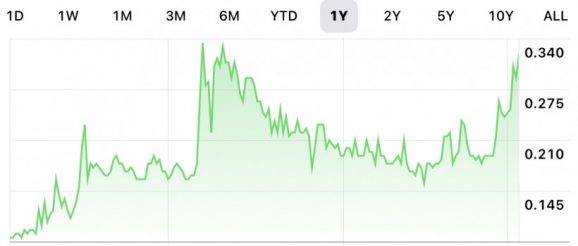The Year in Innovation Stocks

While later-stage companies were the stars of Atlantic Canada’s private capital market last year, their publicly traded counterparts had a rockier 2023. Of the six publicly traded startups that were operating in Atlantic Canada last January, two failed during the year and only two others, St. John’s-based Kraken Robotics and Halifax’s Sona Nanotech, managed to post a return for their shareholders. If an investor had placed $10,000 in an equally-weighted basket of the seven East Coast startup stocks at the beginning of 2023, they would ended the year with just $6,617, losing just over a third of their money. Other than Kraken and Sona, the other four companies in our frazzled investor’s portfolio would have been video game technology specialist Swarmio Media, advanced materials-maker Meta Materials and drug-discovery startups Appili Therapeutics and IMV, all of which are based in Halifax. In February, the Silicon Valley company that acquired sports data analytics startup Kinduct also went public on the Nasdaq via a special purpose acquisition company, or SPAC, though we have not included its shares here because the parent company is headquartered outside Atlantic Canada. Kraken, which makes subsea robots and sensor technology for uses like offshore energy projects and minesweeping, posted its best-ever revenue figures for the quarter that ended in September, bringing in more than $20 million. The stock, which trades on the Canadian Venture Exchange, began the year at 58 cents and finished at 65 cents. On the Canadian Securities Exchange, Sona posted even stronger returns of nearly 200 percent, starting the year at just over eight cents and ending it at 24 cents. In 2023, the maker of technologies for treating cancer raised about $1.85 million from share issuances and spent as much as US$8.7 million or C$11.65 million to buy Boulder, Co.-based Siva Therapeutics. Among the companies whose shares lost value, meanwhile, Appili stock lost the least, ending the year 23 percent in the red. The company won United States Food and Drug Administration approval for its liquid formulation of the common antibiotic metronidazole in September, and last month it announced it had secured a patent for its vaccine against the dangerous bacterial infection Tularemia, which it has been researching with U.S. Department of Defence. And Meta Materials, which is developing materials to bend or refract light and is best known for a joint-venture with Airbus making coatings for aircraft cockpits, saw its shares slide almost 94 per cent, from US$1.10 to seven cents. In October, the Nasdaq warned Meta that its shares had fallen below the minimum bid price required to maintain a listing on the exchange, and last month shareholders rejected a proposed reverse stock split aimed at bolstering the price. The company has until Feb. 21 to boost its stock price or be delisted. First of the two companies to fail was IMV, which entered creditor protection in May. With a focus on developing vaccines that could be used to prevent cancer, IMV was once arguably the leading life sciences company in the region, with a market cap of nearly $240 million. Like Meta Materials, it had been warned by the Nasdaq that at about 23 cents, its shares had fallen below the minimum bid price of one American dollar. And in June, Swarmio closed its doors following what the board described as “liquidity issues.” The company, which had operations in Sydney and Halifax and was listed on the Canadian Securities Exchange, had developed a platform that reduced the latencies between data centres for video games, with the aim of reducing lag for gamers. The company had previously said its decision to go public was spurred by what it described as a lack of private capital at Series A valuations in Canada.
